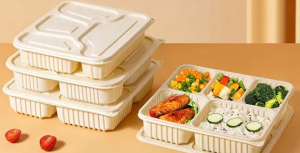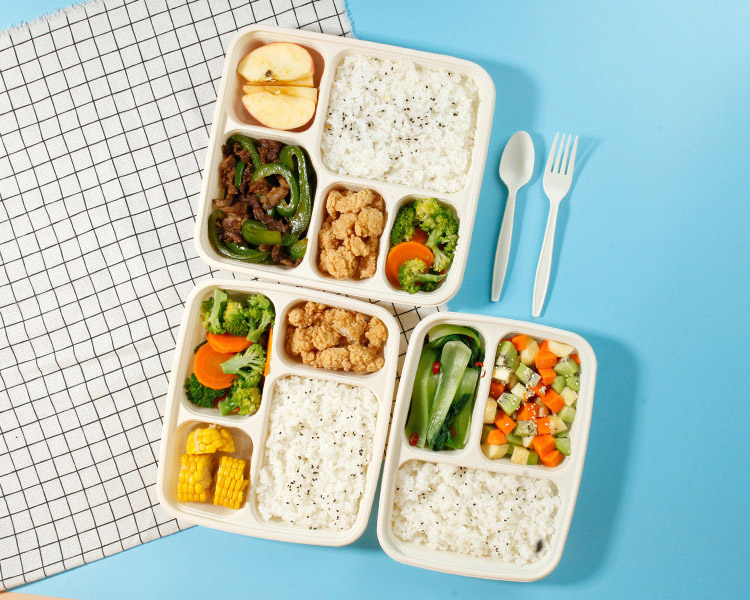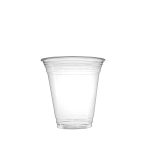Quick Summary
Multi-compartment cornstarch boxes offer a sustainable takeout solution that prevents food mixing, enhances safety, and supports global plastic reduction goals.
Introduction – Why Takeout Packaging Must Evolve
The global foodservice industry has entered a new era. Takeout and delivery are no longer occasional conveniences; for millions of urban consumers, they are an essential part of daily life. Yet, the rise of disposable food packaging has created mounting concerns. Plastic containers—once considered the most practical option—are now recognized as one of the biggest sources of environmental waste and consumer dissatisfaction.
Recent surveys conducted by Deloitte (2024) highlight that over 70% of consumers prefer foodservice providers who adopt sustainable packaging. For businesses, packaging is no longer just a vessel to hold food—it is a key factor in shaping customer experience, brand reputation, and long-term loyalty.
Consumer Pain Points – Where Traditional Packaging Fails
While plastic boxes and foam containers remain common, their flaws are increasingly obvious:
-
Leaks and Spills – Poorly designed boxes cannot contain oily or saucy meals, leading to mess during delivery.
-
Mixed Flavors – Single-compartment boxes often mix sweet, salty, or spicy dishes, compromising taste.
-
Soggy Food – Steam buildup makes fried or crispy items lose their texture.
-
Health Concerns – Microplastics and chemical leaching raise red flags for health-conscious customers.
-
Environmental Guilt – Disposing of non-biodegradable plastics contributes to consumer anxiety about waste.
In short, packaging is no longer a silent background element. It is a crucial part of the customer journey. A poorly designed container can ruin not only the meal but also the dining experience, directly impacting customer retention.
The Role of Packaging in Customer Satisfaction & Brand Loyalty
Research published by Packaging Europe shows that over 65% of consumers are willing to pay more for meals in eco-friendly packaging. Packaging is now tied to values such as sustainability, safety, and health.
For restaurants and foodservice operators, this means packaging is not a cost center—it is a brand statement. The container a business chooses is as much a reflection of its values as its menu. Brands that align with eco-conscious values enjoy stronger consumer loyalty, better online reviews, and improved market positioning.
Multi-Compartment Cornstarch Boxes – A Smarter Solution
Cornstarch-based tableware is emerging as one of the most practical alternatives to single-use plastics. DASHAN’s multi-compartment cornstarch takeout boxes represent a new standard in both functionality and environmental responsibility.

1. Design Advantages
-
Separate compartments preserve flavors and textures.
-
Ideal for balanced meals, combo menus, and diverse cuisines.
-
Prevents cross-contamination, especially for dietary preferences (vegan vs. non-vegan).
2. Environmental Value
-
Derived from renewable corn resources.
-
Biodegradable under proper conditions, minimizing landfill impact.
-
Meets EU Packaging and Packaging Waste Directive and other global sustainability standards.
3. Food Safety and Health
-
Free from toxic chemicals, BPA, and microplastics.
-
Heat and cold resistant, safe for microwaves and refrigerators.
-
Tested and certified for direct food contact.
4. Consumer-Friendly Experience
-
Durable structure prevents leaks and sogginess.
-
Lightweight and convenient for on-the-go dining.
-
Enhances presentation, giving takeout meals a “restaurant-quality” feel.

We also have a 950ml three-compartment container, a 1050ml four-compartment container, and an 1150ml five-compartment container.
Case Studies – Restaurants & Brands Adopting Sustainable Packaging
-
Just Eat Takeaway (UK & EU) has introduced plant-based containers across multiple markets to meet consumer demand.
-
Uber Eats Japan launched a campaign promoting eco-friendly packaging in line with Japan’s Plastic Resource Circulation Act (2022).
-
Starbucks continues to pilot biodegradable alternatives in Asia and North America to reduce its single-use footprint.
These moves illustrate that sustainable packaging is not a passing trend—it is fast becoming an industry standard.
Policies Creating Pressure – A Global Perspective
Governments around the world are tightening regulations on single-use plastics:
-
European Union – The Single-Use Plastics Directive bans certain disposable plastic items.
-
United States (California, New York) – State-level bans on Styrofoam and mandates for compostable packaging.
-
Japan – The Plastic Resource Circulation Act requires businesses to reduce and recycle plastics.
-
United Kingdom – The Plastic Packaging Tax (2025) imposes fees on non-recycled plastic packaging.
These policies are not only legal obligations but also market signals. Businesses that adapt early gain competitive advantages, while laggards risk reputational and financial costs.
DASHAN’s Role – Not Just a Supplier, but a Sustainability Partner

DASHAN is at the forefront of this packaging revolution. With a comprehensive range of cornstarch, bagasse, and PLA products, the company provides end-to-end solutions for restaurants, retailers, and catering services.
Why Choose DASHAN?
-
Certified Safety – All products meet FDA, EU, and SGS food safety standards.
-
Wide Range – From bowls and plates to multi-compartment boxes, designed for diverse foodservice needs.
-
Sustainability Commitment – Continuous R&D to improve biodegradability and reduce carbon footprint.
-
Brand Support – Packaging solutions tailored to strengthen customer trust and enhance eco-branding.
DASHAN is not simply selling containers; it is empowering businesses to align with sustainability goals while delivering superior dining experiences.
Looking Ahead – The Long-Term Value of Green Dining

The future of dining will be defined by eco-conscious consumers and responsible brands. Multi-compartment cornstarch boxes embody this future:
-
They improve dining convenience.
-
They protect consumer health.
-
They reduce environmental burden.
-
They strengthen brand loyalty.
As Dr. Emily Harrison, a sustainability researcher at Cambridge University, noted in a 2024 study:
“The packaging decisions businesses make today will directly shape consumer trust and environmental outcomes for decades to come.”
Conclusion
The era of plastic-dominated packaging is ending. For businesses navigating the takeout boom, packaging is no longer just about cost efficiency—it is about trust, brand image, and future readiness.
DASHAN’s multi-compartment cornstarch boxes redefine the takeout experience by solving consumer pain points while aligning with global sustainability goals. They represent not just a greener choice, but a smarter investment in customer satisfaction and brand loyalty.
References & Suggested Reading
Here are some reliable sources you can reference or use for external linking:
-
European Commission – Single-Use Plastics Directive
https://environment.ec.europa.eu/topics/plastics/single-use-plastics_en -
UK Plastic Packaging Tax (HMRC)
https://www.gov.uk/guidance/check-if-you-need-to-register-for-the-plastic-packaging-tax -
Japan’s Plastic Resource Circulation Act
https://www.env.go.jp/en/press/20210409_1.html -
California Plastic Pollution Policy
https://calrecycle.ca.gov/plastics/ -
Packaging Europe – Consumer attitudes toward sustainable packaging
https://www.packagingeurope.com/ -
Deloitte Insights – 2024 Global Consumer Trends
https://www2.deloitte.com/insights/us/en/industry/retail-distribution/global-consumer-trends.html -
Cambridge University research on packaging and consumer trust
https://www.cam.ac.uk/research
FAQs
Q1: Are cornstarch takeout boxes really biodegradable?
Yes. Cornstarch tableware is made from renewable plant resources and can biodegrade under proper industrial composting conditions, significantly reducing environmental impact compared to plastics.
Q2: How do multi-compartment cornstarch boxes improve the dining experience?
They prevent flavor mixing, keep food fresh, and reduce leakage, ensuring that meals arrive in a better condition for consumers.
Q3: Are these containers safe for hot food and microwaving?
Yes. Certified cornstarch products are heat-resistant, freezer-safe, and suitable for microwaves, while being free from harmful chemicals like BPA.
Q4: Can cornstarch boxes replace traditional plastic containers?
Yes, they provide a sustainable alternative without sacrificing convenience or durability.
Q5: What makes DASHAN’s cornstarch boxes different from other suppliers?
DASHAN offers certified, durable, and diverse eco-packaging solutions, combining quality with sustainability, and actively supports brands in achieving their green goals.




